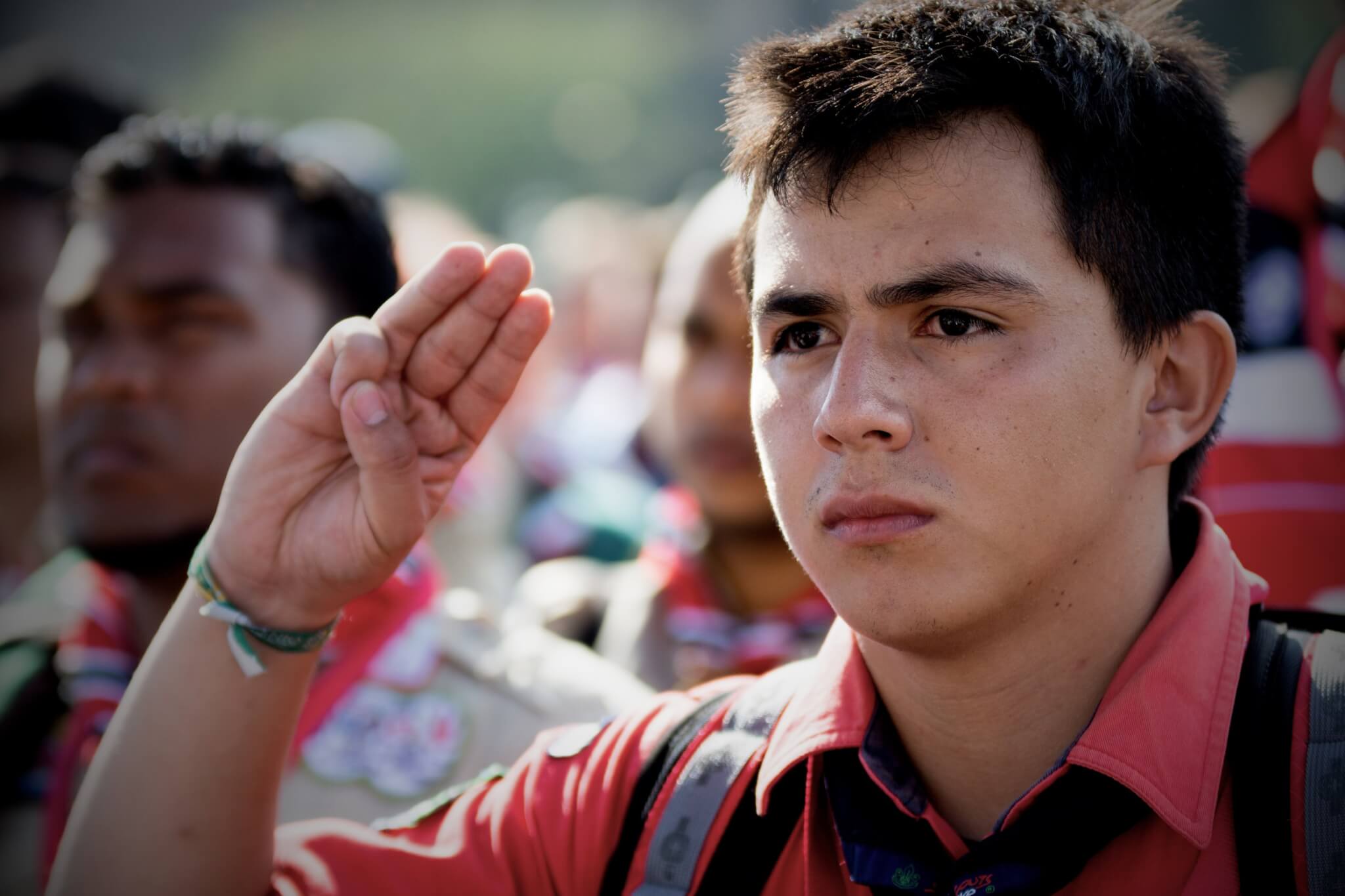Our New Youth Program
Interpreting the Principles of Scouting
![]()
The Scout program enjoyed by youth and adult volunteers is based on three broad Principles which represent the Movement’s fundamental beliefs.
The Principles of Scouting are common the world over, and are communicated as Duty to God, Duty to Others and Duty to Self. They underpin the entire Movement, and it’s important for all Scouts to understand their meaning and intent. All aspects of our new program are designed to fit within these Principles.
The founder of Scouting, Lord Baden-Powell, identified these Principles when developing Scouting in England in the early 1900s. In today’s context, we consider them as they relate to our current world, though the core intent remains true. It’s important to understand B-P’s intent for these concepts through today’s lens, while also taking time to acknowledge how the principles may have been viewed at the time.
|
|
England, early 1900s |
Australia, today |
|
DUTY TO GOD |
At this point in time, being spiritual meant being religious. Religion was central to the lives of the vast majority of British families. Upholding and worshipping religious values was a key part of society. |
Religion is still a central part of life for many, though there is also an increasing group for whom this isn’t the case. Scouting is open to all. We promote an individual approach to focusing on the exploration of our own beliefs and the use of reflections to make sense of our place in the world. |
|
DUTY TO OTHERS |
Early interpretations of duty to others focused strongly on “King/Queen and Country”. B-P came from a military background; service to others was a critical path to success for B-P, and this was to be embedded in the young men he influenced as a soldier, and then as the founder and first Chief of Scouting. |
Scouting has evolved since the early 1900s to build a focus on creating a better world. We still promote our individual responsibilities to our local community, and our country or countries. In a globalised world, we have an increased focus on issues of global importance, and on diversity and inclusion within our society. |
|
DUTY TO SELF |
B-P emphasised that individuals needed to prioritise themselves in order to be of help to others, and that youth was the key time to instil this. |
Over time, society has caught up to this concept – human rights movements have seen an increased focus on the individual for the benefit of society. This remains a central theme – you can see this concept clearly in our Purpose. |
Duty to God
In Australian Scouting, we use an inclusive approach to ‘Duty to God’, focusing on exploring spiritual beliefs and the use of reflection as a tool for development. You’ll notice this approach to Duty to God, including spiritual development, reflected in our Promise.
Scouting is inclusive and open to all; we have no requirement for our members to be religious or believe in a God.
Those who are religious are encouraged to explore and develop their relationship with their own religious practices and beliefs.
As an inclusive organisation, there’s a variety of different beliefs and spiritual perspectives in our movement. Some people aren’t too sure about how to approach this, which is why this is a pretty well-resourced aspect of Scouting. We use an ongoing focus of stopping for reflection, exploring beliefs, being thankful and showing respect for others through a symbolic tool called the Internal Compass.
When thinking about spirituality in Scouting, it’s important to understand what this means. Scouting defines it as “The feelings or beliefs of a person regarding their purpose in life, connection to others and place in the world around them. These spiritual feelings or beliefs may change as a person develops, and guide their actions throughout their life.”
This definition of spirituality relates directly to how we work towards the Principle of Duty to God, and of course, the personal growth of the young people we work with. Exploring this definition of spirituality with the Scouts you work with is key – it provides context for them to be able to understand and explore their own position, and their understanding of the world.
Duty to Self
Scouting is focused on personal development, with the individual at the centre of all that we do. The Mission talks about self-fulfilled individuals playing constructive roles in society. Our Purpose spells out the developmental areas of Scouting – SPICES. Each statement focuses on the individual being prepared to play active roles in their communities.
Our increasingly fast-paced world demands continuous learning for individuals to be successful. Scouting focuses on soft-skill development to help prepare our young people for rapidly changing world.
Duty to Self is the reminder to Scouting members that to look after others, you first should look after yourself.

Duty to Others
We generally think of our Duty to Others as a Scout’s personal responsibility to their community; in a broader sense, it’s also about our whole Movement’s responsibility! Key focus points are respect and empathy, involvement, community and friendship.
Community involvement is an element of our Scout Method; we use this approach as a learning experience for our members. Ultimately we work with Scouts for them to develop an understanding of community and their responsibility within their own communities, helping them to become active global citizens. We challenge Scouts to help make their communities better places through creativity and commitment.
Through Scouting, we develop teamwork and the ability to draw together a community for a common goal.
For individuals, the focus is on:
- Giving and building respect
- Creating a friendly and welcoming community
- Ensuring minimal environmental impact
- Collaborating to assist in the community – locally, nationally and globally
